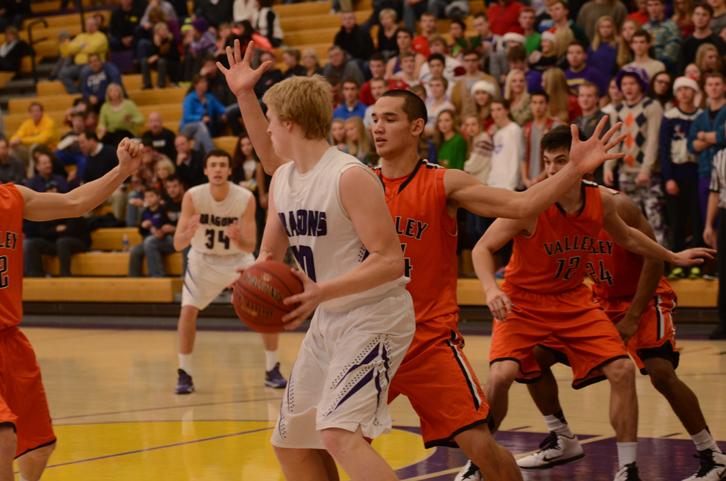Racial slurs thrown at basketball game
Number 44 from the West Des Moines Valley Tigers boys’ basketball team guards senior Regen Siems.
January 14, 2015
It was the last quarter of the varsity boys’ basketball game. The Dragons were down by 12 to the West Des Moines Valley Tigers, and students and fans were becoming more frustrated with how the game was ending. Obscenities and racial slurs were not the first thing I expected to hear coming out of the student section during the game, however, I turned out to be mistaken.
While a player from Valley was shooting free throws after being fouled, I heard some students behind me in the student section yelling at him, calling him a “chink,” which is a slur directed towards Asian people. This player, number 44, looked as if he were partially African-American and Asian, and it was directed towards him to make him miss his free throw.
At another point in the game, number 44 was fouled again, allowing him to shoot more free throws. These same students behind me who called him a “chink,” began yelling the question at him, “steamed or fried?” When those students yelled these comments towards number 44, it not only made them look bad, but it was a poor representative of the entire student body, the school, and the whole community. After both of these incidents, I turned around to give them a glare, and told them that it was not okay to make those comments.
Racially charged comments are not something to be joked about, and they should not be simply laughed off. It is not just a joke. It is not funny.
However, being passive while these situations are happening is just as bad. There is a difference between simply not participating in something because you don’t agree with it, and working to put an end to it.
I do not understand the idea of mocking someone for their ethnicity to hinder their performance in a sport. With that said, I do not understand mocking someone for their ethnicity in general. Though we live in this land of white suburbia, we must still be aware of our words that we say because we are always at risk of hurting others.
Upperclassmen in high school should be setting an example for the younger students who attend basketball games. But when upperclassmen yell racially charged statements, some younger students will start to think that is okay to say the same things, when it is anything but okay.
After the game I was discussing what had happened when my friend, senior Logan Beguhn, brought up the point that it is not uncommon for these types of comments to be made during games. “Welcome to sports,” he said. He did not attempt to justify these statements, only to bring up the point that is common to hear these things said at sporting events.
But when did it become a norm for fans to attack the opposing team’s players for the color of their skin or for the way that they look?
Sports are highly competitive, however, that should not get in the way of how someone is perceived or how they should be treated when it comes to their skin color.
The underlying problem of what happened at this basketball game is a form of racism. Race, ethnicity and looks are not things to mock someone for, because it is not bad to be a different color than someone else, or have a different eye shape, or to eat different things in from a different culture. This is common, and we should celebrate diversity instead of look at it as being something bad.
Students need to be more aware of what they are actually saying, because words do hurt people. As a member of the student body, it was embarrassing to be in the same section as where these comments were coming from.





